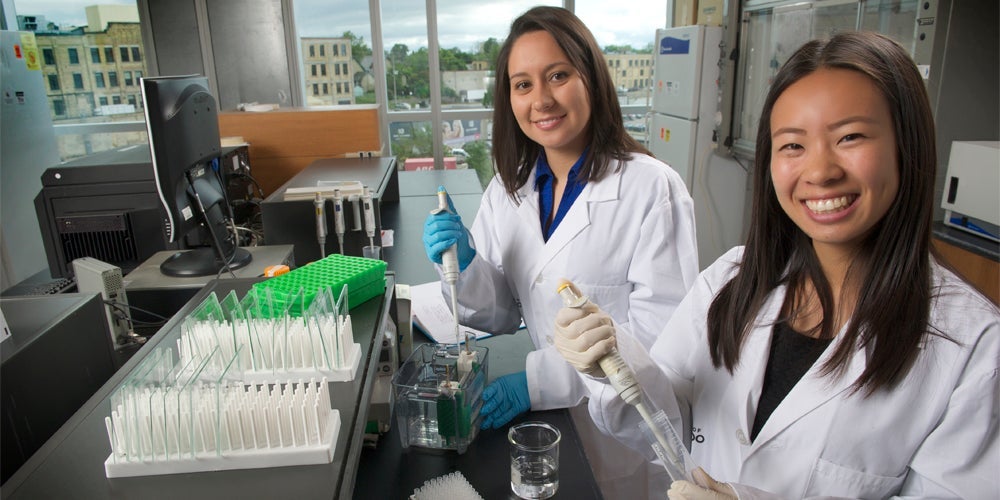
Written by Tamara (she/her), student
Making decisions about a master's degree or other graduate programs may seem a little premature if you’re in high school or even if you’ve just started university. But take my advice: it’s never too early to start researching your options and preparing for the future.
If you’re interested in continuing your studies after your first degree, there are a few key things you need to know about graduate studies, post-graduate programs, and master’s degrees.
I’m here to break down the basics when it comes to graduate programs and provide you with some thoughts to consider when deciding what to do after graduation.
Post-grad 101
When you enter university, you're typically enrolled in an undergraduate (undergrad) program. These programs usually last four to five years and allow you to take courses based on your interests. Once you’ve finished your undergrad program, you will have graduated with a bachelor’s degree, such as a Bachelor of Arts (BA), Bachelor of Science (BSc), or Bachelor of Mathematics (BMath).
If you’d like to continue your education, there are many options available. A common path would be to pursue a master's degree and then for some students, even a PhD. Others will apply to programs such as a Bachelor of Education to become a teacher or to law school or med school.
Graduate (grad) school or a post-graduate (post-grad) program is for individuals who have graduated from a bachelor’s degree and are hoping to pursue a more advanced degree to further their education and/or career.
In terms of post-graduate programs, there are a wide variety of programs available to suit many unique interests and disciplines. We will focus on some of the post-grad options available, and I’ll start by breaking down some of the main categories.

Professional vs academic programs
Professional
A professional post-grad or master's program is typically meant to prepare a student for a specific profession or career. Common examples include professions such as medicine, law, social work, education, architecture, or health professions such as physiotherapy.
Students in these programs will be learning fundamental theory and skills needed to practise in these professions.
These programs typically have some form of internship or practicum where students will work or volunteer in the community under direct supervision and guidance from a mentor in that profession. Due to the nature of many of these fields, the professional post-graduate degree is often a requirement in order to be eligible to practice.
If you’re considering a career in these fields, it’s important that you research in advance the educational requirements so that you can plan accordingly.
Academic
An academic post-grad or master’s program typically involves a more concentrated focus on an area of study. These programs are very diverse and can lead to many different career opportunities.
These programs offer students the chance to explore topics on a deeper and more analytical level.
Some jobs and careers will consider a master’s program to be a requirement or an asset, and in many cases, these degrees work favourably in terms of job applications and qualifications.
While there are many different types of academic post-grad programs, these also typically break down into two separate categories: research and coursework.
Research vs coursework programs
There are many similarities between these two types of academic master’s programs. Despite the naming, typically all programs will have some level of research work and some level of coursework. The main difference between these programs is the amount of time spent on each.
Research
In a research-based master’s program, the primary emphasis is on the research aspect.
Students in these programs will take fewer courses than their course-based peers, and these courses will be taken in order to grow knowledge base to carry out future independent research.
The main focus in this program is to carry out independent research, and most programs will require students to complete a research thesis by the end of their program. Students who complete academic post-grad programs are well equipped to understand complex problems in multidisciplinary areas.
Coursework
In a coursework or course-based master’s, students will primarily take graduate-level courses within their field or discipline.
These courses will often have larger assignments, capstone projects, research seminars or formal presentations and reports built into the curriculum.
Some research will be incorporated into the course content, and students may have the option to do some independent research, but the focus is not on the research aspect. Students in course-based master’s programs may also have co-op, internships, or practicums built into their degree.

Now that you know a bit more about post-grad options, is this the right option for you?
Below are some reasons why you may or may not consider doing a post-grad program, and some questions or thoughts to keep in mind.
Considering graduate school?
One of the main reasons to pursue further education after your first degree is to continue learning. If you love learning and being a student, post-grad programs can be a great way to stay in this environment.
Or you may be fascinated in a topic that you learned in undergrad, and you want to deepen your knowledge in this domain. Or perhaps you want to pivot and expand your interests a bit, and you decide to take a multidisciplinary program to build bridges between multiple interests you may have.
Pursuing further education is valuable in so many ways, and students who have the genuine passion to continue their studies should look into post-grad programs to find something that interests them.
Post-grad programs can also be excellent preparation for a specific career. As mentioned in the section above, some programs, such as professional master’s programs, are required for entry into that profession. But all post-grad programs provide students with advanced knowledge, skills, and qualifications to enter the workforce and experience a rewarding career.
I decided to pursue graduate studies because it aligned with the interests I discovered in undergrad. I knew I wanted to pursue a career in this field and wanted to be best equipped. Also, having done a lot of undergraduate research, I knew I wanted to continue exploring academia.
Considering other post-grad experiences?
There are a number of reasons why pursuing a master’s or post-grad degree may not be the best route for you after earning an undergraduate degree. After completing four to five years of courses, co-op work terms, part-time jobs, internships, and other forms of involvement, you may be looking for a change of pace.
Undergrad can be a busy period of your life and after working hard to get that degree, it may be time for a break. For example, if you start working in your field, you may not have deadlines on evenings and weekends, and you won’t have tests to study for or exams to write. Some grads want to experience that sense of closure on finishing school and moving on to other pursuits.

Not pursuing a post-grad program can also give you the opportunity to gain other life and professional experiences. There could be a job you’ve always wanted to try or maybe you want to gain some experience in that field before taking on more education in that area. Maybe you're able to self-learn outside of the classroom, and your career has professional development opportunities for you to learn and practice new skills.
There is also the added bonus of earning income, which can be used towards any and everything, from paying back student loans to starting up financial investments. These investments may also be tied to personal life goals. Perhaps you are starting a family, or you want to start one soon. Perhaps there is a new city or country that you are hoping to explore, whether to travel or maybe even to settle down.
Perhaps you want to take your passions and hobbies and turn them into a full-time gig. Maybe school just isn’t one of your top priorities at this time. This doesn’t mean that you can't change your mind later on, but it means that you have chosen to pursue other endeavours at this stage in your life.
Ultimately, I decided it wasn't the right time for me. I'm at a period in my life where I haven't determined my career path, and it doesn't make it easier knowing the options are endless! All I know is that I want to help people, and I think until I've determined HOW I want to do that, grad school will have to wait. Until then, I'm in the workforce, gaining experience that will help guide my path for the future.
Considering a hybrid approach?
Perhaps you’re unsure about what you want to do after graduation. You've thought about going to grad school, but you’re still trying to find the perfect program. If you’d like to gain experience while also pursuing a post-graduate degree, part-time study options are available, depending on the program.
It’s certainly possible to do post-graduate studies while also balancing other things, but it definitely takes some extra coordination and logistics. For some individuals, this is the perfect way to satisfy career and education goals by gaining experience and learning at the same time.
Final advice
Ultimately, when it comes to education, there is no right or wrong answer or set path for you to follow. I encourage you to reflect on your personal and professional goals and think about whether or not a master’s degree or post-graduate program is the right step for you.
And remember – there’s no rush to decide. You could do an undergraduate program, take some time off to work, travel, or just discover more about yourself, and then come back to school. Education is a lifelong journey, and just like other life experiences, it's best to advocate for yourself and choose your own pace and direction.
Related articles

Should you specialize or keep your studies broad?
Well ... it depends! Check out all the pros and cons of focusing your studies or keeping them broad so you can make the right choice for yourself.

How to choose a career

How to get into medical school
We've got the inside scoop on how to create a stellar application — and what it takes may surprise you!

